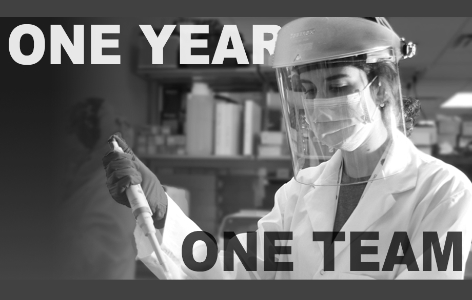
By: Priska Stahel, ORT Times Science Writer
As the end of 2020 nears, the UHN research community of over 1,100 principal investigators (including affliated scientists), 1,100 trainees and 2,400 staff members can proudly reflect on their collective success despite this year’s widespread challenges.
The recently published One Team Research Report provides an extensive report on research developments at UHN in 2020, highlighting that over 3,600 publications have come from UHN scientists this year.
Breakthroughs in COVID-19 Research at UHN
Several UHN researchers are leading clinical trials to find effective treatment options. Rather than looking for new treatments, Dr. Eleanor Fish is investigating whether drugs that are currently available could be used to treat COVID-19 in collaboration with researchers in Wuhan, China. The research team has shown that antiviral drugs used during the SARS outbreak of 2002–2003 are effective at reducing the duration of infection with SARS-CoV-2 in people hospitalized with moderate symptoms.
Ongoing international clinical trials led by Drs. Steven Chan and Vikas Gupta are looking at re-purposing cancer drugs to treat hyperinflammation seen in late stage COVID-19 patients to hopefully avoid putting patients on ventilators. Similarly, Drs. Ewan Goligher and Patrick Lawler are leading a multi-centre, international trial to understand whether the anticoagulant heparin can reduce the formation of blood clots in people hospitalized with severe COVID-19.
UHN researchers are assessing the prevalence of asymptomatic SARS-CoV-2 infection among health care workers. Led by Dr. Deepali Kumar, the ongoing RESPECT study identified previously unrecognized infection in asymptomatic health care workers and helped contain outbreaks in hospital wards. This local effort proves the utility of asymptomatic testing to help contain this virus.
The multidisciplinary environment at UHN and the excellent reputation of the University of Toronto enables UHN researchers to lead innovative research on multiple facets of COVID-19. These examples provide a snapshot of how UHN researchers are leading international teams to improve treatment options and working locally to understand the spread of SARS-CoV-2.
Other Major Research Developments at UHN
While COVID-19 has been a major research focus for 2020, several other exciting developments deserve mention.
In 2019, UHN created The Institute for Education Research (TIER), which focusses on medical education research to develop new models of learning for health care professionals. This institute of 35 principal investigators has already contributed 93 publications, including case reports on patient engagement and the importance of struggle in learning.
On an individual level, Princess Margaret Cancer Centre Senior Scientist Dr. Trevor Pugh was named one of Canada’s Top 40 under 40 for 2020. Dr. Pugh’s cutting-edge cancer genomics research aims to accelerate early cancer detection and evaluate responses to treatments. He has earned the top 1% of citations in his field over the last decade.
Despite the unforeseen challenges of 2020, UHN researchers have demonstrated their determination to make significant contributions to medical research. Moving forward into 2021, UHN is well-positioned to use its innovative and multi-disciplinary environment to tackle pertinent health concerns.




